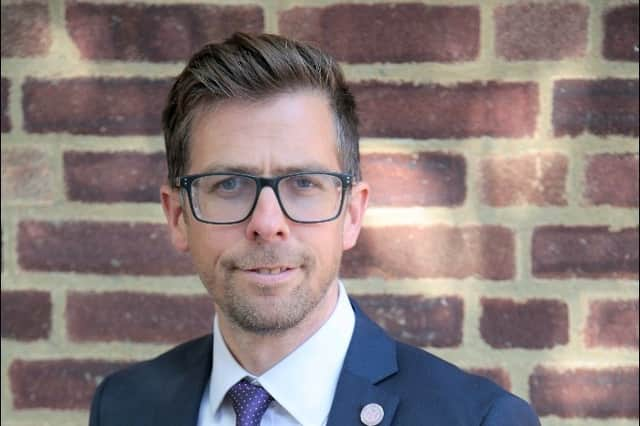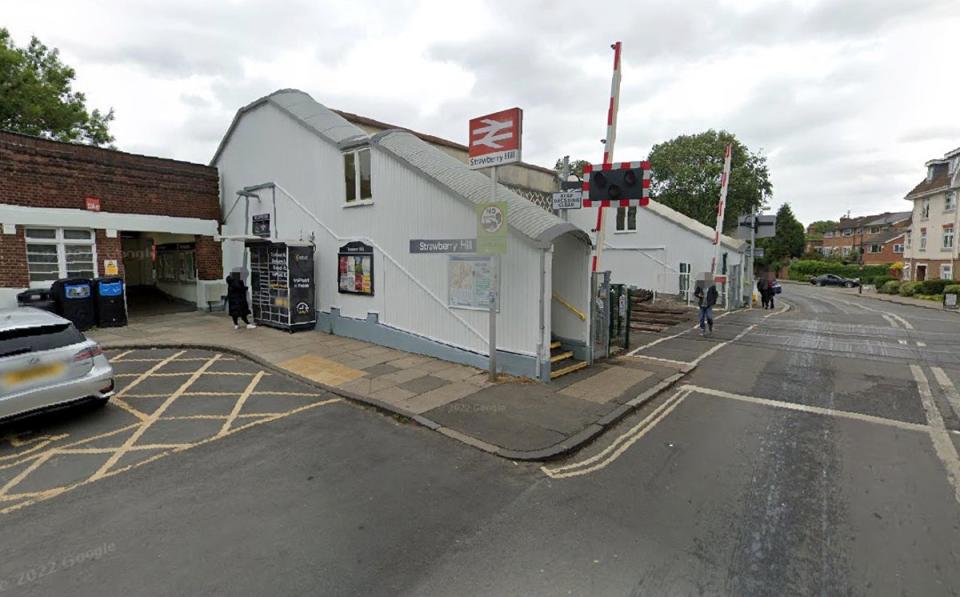8.26am EST
08:26
Some people may need four Covid jabs, expert says
Some people may need a fourth dose of Covid vaccine to remain protected, a government scientific adviser has said, with a decision expected shortly after the Christmas and new year holidays.
Prof Adam Finn said:
I think there may well be people who received their boosters early who are in the older more vulnerable age groups who may need a further jab. That has not been decided yet. It is still under review and discussion, and we will be providing recommendations on that at some point in the new year.
Some people may need a fourth jab. Photograph: Kirsty O’Connor/PA
Finn, a professor of paediatrics at the University of Bristol and a member of the Joint Committee on Vaccination and Immunisation (JCVI), told LBC Radio on Thursday: “I think there will be people probably who will receive a fourth jab. Whether that will be everyone, I think, is still very much in doubt … We do need to see how things go through this wave and beyond.”
On Tuesday, Israel became the first country to announce it would offer a fourth dose of vaccine to people over 60 and healthcare workers, in an effort to increase protection against the Omicron variant.
8.23am EST
08:23
Healthcare workers around the world have been on the frontline of the coronavirus pandemic for almost two years, which put them through the darkest days of their careers.
Five doctors who have worked in hospitals in Uganda, New Zealand and the US, India, England, and Brazil told the Guardian about how the pandemic has tested them personally and professionally, but how they continue to find hope and resolve to keep working.
Voices of Covid doctors: ‘It was always about trying to save you’ – video
8.05am EST
08:05
Cross-Channel asylum seekers could be tagged under Home Office plans

People crossing the Channel in small boats to claim asylum could be tagged on arrival under Home Office plans, it has emerged.
The home secretary, Priti Patel, is expected to announce the plan early in the new year as part of her overhaul of the immigration system.
According to a government source familiar with the plan, ministers believe that making working-age people wear tags while their asylum claims are processed would make it harder for them to work illegally during this period – reducing the UK’s “pull factor”.
Ministers also believe that tags would stop people absconding during the application process. The government wants more people whose asylum applications fail to be removed from the country, although absconding is only one factor and there are significant legal reasons why removal numbers are low, including the UK’s post-Brexit withdrawal from the Dublin agreements, which enabled people to be returned to EU countries they had travelled through.
More than 27,000 people have arrived in the UK this year by crossing the Channel on small boats, up from 8,500 in 2020, and Patel has faced strong criticism, particularly from within the Conservative party, for not doing more to curb these numbers.
7.52am EST
07:52
Two Premier League games scheduled for Boxing Day have been called off because of Covid outbreaks at Leeds and Watford.
Leeds’ game at Liverpool and Watford’s at Wolves have become the 11th and 12th top-flight matches postponed as a consequence of the virus. The affected clubs made postponement requests that were accepted by the league’s board.
The Premier League said: “The league is aware that the decision to postpone these two matches will disappoint supporters and understands their frustrations at a special time of year when fans look forward to attending and watching football games. The league aims to provide as much clarity as possible, but unfortunately postponements sometimes have to be made at short notice, as safety is the priority. The league will endeavour to keep supporters updated if games become at risk on a matchday.
“The board concluded that Leeds United will not be able to fulfil their fixture this weekend due to the number of players with Covid-19, injuries and illness. The club’s training ground has also been closed after consultation with the UK Health Security Agency and the Premier League.
“Watford FC continue to have an insufficient number of players to field a team after their game against Crystal Palace FC last Saturday was postponed following a Covid-19 outbreak. Due to players coming out of isolation, it is fully expected Watford will be available for their fixture on Tuesday 28 December, against West Ham United.”
7.49am EST
07:49
One in 45 people in England had Covid last week
It is proving to be a bumper day for anyone interested in coronavirus data and statistics.
Latest estimates from the Office of National Statistics (ONS) have found that around one in 45 people in private households in England had Covid in the week to 16 December, up from one in 60 the previous week. One in 45 is the equivalent of about 1.2 million people and is the highest number since the ONS began estimating infection levels for England in May 2020, the Press Association reports.
In Wales, around one in 55 people is estimated to have had Covid in the week to 16 December, unchanged from the previous week and below the recent record high of one in 40. In Northern Ireland, the latest estimate is one in 50 people, also unchanged from the previous week and slightly below the record high of one in 40 in mid-August.
For Scotland, the latest estimate is one in 70, up from one in 80 the previous week and below September’s peak of one in 45. All figures are for people in private households.
Meanwhile, the percentage of people testing positive in the latest week is estimated to have increased in all regions of England except the north-east, south-west and West Midlands, where the trend is uncertain, the ONS said.
In London, around one in 30 people was likely to test positive in the week to 16 December – the highest proportion for any region. Yorkshire and the Humber had the lowest proportion, at around one in 65.
When modelling the level of Covid infections among different age ranges in England, the ONS said rates have increased in the latest week for all groups except those from school year 7 to 11 and for people aged 70 and over, where the trend is uncertain. Rates were highest for those aged two to school year 6, at 5.9%.
Updated
at 8.37am EST
7.43am EST
07:43

The UK public’s appetite for eating out has plunged to its weakest since the spring amid growing evidence of the impact of the Omicron variant on the hospitality sector during its crucial pre-Christmas period.
The number of seated diners fell by 14 percentage points in the week ending 20 December to 88% of the level in the same period of 2019, before the start of the pandemic, according to the weekly digest of flash economic indicators from the Office for National Statistics (ONS).
Using data from the online restaurant booking site OpenTable and other sources, the ONS said Britons were eating out less and working from home more in response to rising infection rates and the government’s plan B measures.
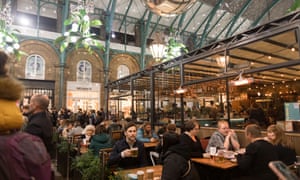
People seen dining out at a restaurant in Covent Garden. Photograph: Belinda Jiao/SOPA Images/REX/Shutterstock
Amid widespread reports of bookings being cancelled, the drop in the number of diners in the latest week was the sharpest since early September and the lowest level since restaurants reopened indoors in England, Scotland and Wales in May after last winter’s lockdown. It was also the first time the weekly comparison with 2019 has dropped below 100% since May.
Restaurants in London have been especially hard hit by Omicron, with the number of diners in the latest week falling 18 points to 57% of the level in the same period of 2019. In Manchester, despite an eight-point drop on the week, the number of diners stood at 104% of the level in the run-up to Christmas 2019.
7.33am EST
07:33
The number of people waiting for treatment from NHS Wales has reached record levels, with the Welsh government admitting they are likely to continue to rise.
There are now 680,000 patients on the waiting list – the highest recorded figure since comparable data was first collected in 2011.
Although waiting list figures were high prior to the Covid-19 pandemic, the number typically varied each month between 400,000 to 500,000 and tended to be highest in late summer and lowest in January. However, since April 2020 the number has steadily increased every month.
In October, the latest available data, the number of people yet to begin treatment was over 45% higher than in the same month before the pandemic in 2019. The percentage of people receiving treatment within the target 26-week period from point of referral remains extremely low.
A Welsh government spokesperson said:
Our NHS is facing its toughest winter ever and our hardworking staff continue to show unwavering commitment to delivering high-quality care to hundreds of thousands of patients each month. We have committed £1bn this Senedd term to helping the NHS recover from the pandemic and to treat patients as quickly as possible.
This week we have also committed funding to deliver the Real Living Wage for social workers, who are critical to helping people out of hospital and freeing up bed space. However increasing challenges from Covid pressures mean waiting times have and will continue to rise.
The Welsh government announced on Wednesday an extra £34m for ambulances, including extra staff, non-urgent patient transport and increased military support.
The Welsh Conservative shadow health minister, Russell George, said:
Although coronavirus and the pent-up demand from previous lockdowns is obviously a huge factor in today’s damning statistics, there has to come a point when things get better.
However, Labour’s record over two decades is one where things have gotten perpetually worse: doubling the waiting list in the year before Covid struck, experiencing its worst-ever A&E waits the year before the pandemic, and removing conditions like strokes from the red-call ambulance criteria.
Updated
at 7.41am EST
7.31am EST
07:31
Sturgeon warns against getting ‘carried away’ with Omicron data

Nicola Sturgeon has warned against getting “carried away” with the latest Omicron data, as she again rejected pressure to reduce the 10-day Covid isolation period in Scotland.
At the final session of first minister’s questions before the Christmas recess, the Scottish Conservative leader, Douglas Ross, criticised Sturgeon for remaining overly cautious despite the latest studies reported yesterday suggesting that the Omicron variant is less severe than Delta.
Ross said that to protect essential services and the economy from a surge in isolation-related absences, adding: “These rules are forcing whole families to self-isolate for 10 days, even if they have tested negative.”
On Wednesday, the UK government reduced the Covid self-isolation period to seven days in an attempt to ease mounting staff shortages.
Sturgeon pointed out that sector-based exemptions to self-isolation rules had been published earlier today, but said she would not make changes to the self-isolation rules until the public health benefits outweighed the risks, explaining: “If we act rashly right now we risk a counterproductive effect …. these studies are really positive but they are also early data. Even the authors are saying ‘don’t get carried away yet with what these studies are telling you’.”
Updated
at 7.42am EST
7.19am EST
07:19
Covid antibody levels among adults in the UK are estimated to have reached a record high.
Some 95% of the adult population of England is likely to have tested positive for antibodies in the week beginning 29 November, along with 95% in Scotland, 95.3% in Northern Ireland and 93.6% in Wales, according to the Office for National Statistics (ONS).
These are the highest figures for all four nations since the ONS began estimating antibody levels in December 2020.
There has been an increase in antibody positivity in those aged 65 years and over across the UK since early October 2021, which the ONS said was “likely as a result of the vaccination booster programme”.
The figures do not include people in hospital, care homes or other communal establishments.
Updated
at 7.27am EST
6.54am EST
06:54
Sajid Javid also said he welcomed studies which have suggested the Omicron variant may cause less severe illness than earlier strains but warned it could still lead to “significant” hospital admissions.
“That is, of course, good, encouraging news. They are not very clear yet though by how much that risk is reduced,” he said, adding:
We do know with Omicron that it does spread a lot more quickly, it is a lot more infectious than Delta, so any advantage gained from reduced risk of hospitalisation needs to be set against that.
If a much smaller percentage of people are at risk of hospitalisation, if that is a smaller percentage of a much larger number, there could still be significant hospitalisation.
The first UK data of its kind found that the Omicron variant of coronavirus does indeed appear to be milder, with a 20%-25% reduced chance of a hospital visit and at least a 40% lower risk of being admitted overnight.
In what was described by scientists as a “qualified good news story”, two studies on Wednesday pointed to a lower risk of hospitalisation with Omicron.
An Imperial College outbreak modelling team led by Prof Neil Ferguson analysed hospitalisations and vaccine records among all PCR-confirmed Covid cases in England between 1 and 14 December. The dataset included 56,000 cases of Omicron and 269,000 cases of Delta.
6.36am EST
06:36
Sajid Javid says there will be no further announcements on Covid restrictions in England before Christmas
The health secretary, Sajid Javid, has said there will be no further announcements on Covid restrictions in England before Christmas.
He told broadcasters on Thursday:
We are not planning any further announcements this week. Despite the caution that we are all taking, people should enjoy their Christmases with their families and their friends – of course, remain cautious.
We will keep the situation under review. We are learning more all the time as we have done from this new data. We will keep analysing that data and if we need to do anything more we will, but nothing more is going to happen before Christmas.
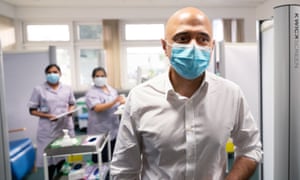
Sajid Javid visits St George’s hospital in south-west London, where he talked to staff and met Covid 19 patients. Photograph: Stefan Rousseau/PA
He added that staff absences due to Covid were adding to pressures on the NHS but said the easing of self-isolation rules would help.
He said:
The NHS workforce was already under pressure before Omicron came along. There is increased pressure in many workforces at the moment, especially if someone needs to isolate if they have a positive case,” he told broadcasters.
Some of the recent moves we have had, moving from 10-day to seven isolation if you take a test in the last two days, I think all of that will help.
Updated
at 7.48am EST
6.32am EST
06:32
The Prince of Wales and the Duchess of Cornwall will be with the Queen on Christmas Day, a Clarence House spokesman has confirmed.
The Queen is to celebrate Christmas at Windsor Castle, breaking with the tradition of spending festivities at Sandringham in Norfolk for a second year.
Sources stressed that all appropriate guidelines would be followed and sensible precautions would be in place.
It is understood that the decision was a personal one taken after careful consideration and that it reflected her precautionary approach during the pandemic. Downing Street has been informed of her decision.
Unlike at Sandringham, where members of the royal family gather and walk to St Mary Magdalene church, greeting members of the public outside, there is not expected to be any public church visit on 25 December.
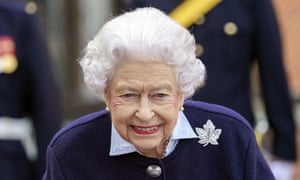
Britain’s Queen Elizabeth II meets members of the Royal Regiment of Canadian Artillery at Windsor Castle, Windsor. Photograph: Steve Parsons/AP
6.17am EST
06:17
Following the news that nightclubs in Scotland are to close from 27 December for a three-week period, the Scottish Tories have called for extra financial support for businesses.
The Scottish Tory Covid-19 recovery spokesman, Murdo Fraser, said also described the latest news as a “further setback to a sector already on its knees as a result of previously-announced restrictions” as Scotland looks to tackle to fast-spreading Omicron variant. He added:
I understand that this is a fast-moving situation but, when announcing this enforced shutdown, John Swinney should have spelt out the exact details of the support package that will be given to nightclub businesses, rather than merely promising an update on allocation ‘as soon as possible’.
That’s not good enough – businesses on the brink need to know now exactly what financial support they will receive, and when.
The SNP government has been given an extra £440m in assistance from the UK government. They need to get that money out the door and into the hands of beleaguered Scottish businesses immediately.
Updated
at 6.55am EST
https://www.theguardian.com/politics/live/2021/dec/23/uk-covid-live-news-coronavirus-omicron-boris-johnson-latest-updates



